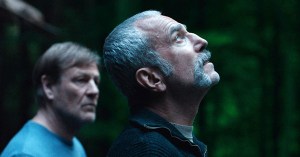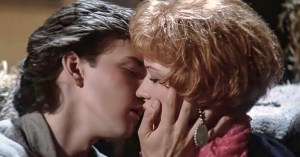Sarah Silverman Calls I Love You, America ‘Aggressively Dumb’ (But It Sounds Pretty Smart)
The comedian says the Harvey Weinstein revelations are "horrifying," but don't expect to find that topic on her new Hulu series, which isn't about the day's news or Donald Trump.

Actress and comedian Sarah Silverman’s new show I Love You, America can’t avoid politics because, that is part and parcel of the time we live in now. But politics are not necessarily its focus. Rather, Silverman told Rotten Tomatoes, it’s more about reaching out to all different kinds of people across the country — a goal that may raise more than a few suspicions from critics of the outspoken and politically active star.
Silverman gives us some insight into the new series, reacts to the revelations of sexual misconduct by Hollywood studio executive Harvey Weinstein, and reveals that the show won’t be a play-by-play of President Donald Trump’s latest antics.
Andrea Reiher for Rotten Tomatoes: So walk us through how the show came about — was it solely in response to the way the political climate changed in the last year or so or does it pre-date that?
Sarah Silverman: I think it’s maybe a little before then. I guess I was doing a lot of acting, and I love acting, but I felt like I wanted to do this. I wanted to do something that was more socially political and just more relevant to this time, this moment in time. I felt like I wanted to use more parts of me. It just didn’t feel like I was using all my parts, especially now.
The video you released of the I Love You, America song is really funny, but it also makes a few pointed, smart political observations. Is that kind of the aim of the show in general?
Silverman: Yeah. I think it represents the feel of the show, even though it’s not necessarily going to be a whole bunch of music videos. But we always want to be funny, silly, aggressively dumb, but also lean into feelings and lean into talking out loud about the nuances of the world right now and being a human in it.
The thing that I always bring up in the writers’ room over and over again is this thing I heard Mr. Rogers say when I was little, which is, “If it’s mentionable, it’s manageable.” It’s such a big part of my life, and I feel it’s so essential right now. One thing I’ve learned doing this show is facts don’t change people’s minds. They just don’t. Feelings do, emotions do. So I think if we can just have dialogue or be brave enough to be vulnerable — of course, none of this sounds funny, but this is the skeleton of the show that I think of in my mind. I just don’t know how people will see it on an individual basis, but to me it’s about being vulnerable and saying things that are often unsaid or hard to articulate, even if it sounds base or even if it is silly. Anything can be dealt with once it’s said out in the open.
Do you think you’ll appeal to a broad audience, appeal to both ends of the political spectrum?
Silverman: I don’t know. I’m curious. Listen, I have very strong political views — that’s a part of me and I’m not pretending it isn’t there with this show, but I do think if people are open to it, it’s definitely not something where I think anything I say will make people’s porcupine needles go up, especially with the field pieces. I go to Trump country, I spend a lot of time with Trump people, and when you’re one on one, it’s very different than being far apart and things being black and white and people being good and evil. Our defenses go down with the first hug hello, you know? And once your defenses are down, you tend to be more open. I just found with meeting people and talking to people in those pieces, you may surprise yourself that you’re able to love them and they’re able to love me. Until we actually embed ourselves in places that we’re judging or with people that we think we know, we can’t really know.
I can talk all deep and heady, but the show is mostly, I would hope, silly and funny. Anything intellectual or with something to say or heady at all is served in a big, bready, dumb sandwich, which is the only way I’d have it.

Recently, late-night hosts have been criticized for not going after the Harvey Weinstein news. What do you make of the allegations and is that something your show would potentially tackle or is that not really political enough, if you know what I mean?
Silverman: We really rarely talk about actual politics, day-to-day politics, at all. The show is of this time, it’s political by virtue of being a show that is on at this moment in time. We’re not addressing stuff that happened today, because there are too many shows that do that brilliantly. As for Harvey Weinstein, I don’t know. I don’t think that’s going to come up on this show. It might come up in a general way, like the topic may come up. I’m not avoiding it, it just isn’t necessarily — I can’t say we never would, but I’m not planning [on it].
I did a huge deep dive on it last night, I caught up on all of it last night and it’s horrifying, but it’s also good that this stuff gets exposed and there’s a conversation about it. It’s interesting the people that lose their jobs — and I’m glad they do — but our own president seems to be immune to it.
That’s a great segue. What about Trump? Is it hard not to focus on him too much?
Silverman: It isn’t. There’s never a point where I feel like we’re avoiding an elephant in the room, but when you see the show, it’s another part of our lives that I’m examining that’s relevant to all of it. Everything we say and talk about it and joke about are things that can extrapolate to every current thing that’s happening, but there hasn’t been a place for him in this show, really. It’s specific and yet it’s more broad. It isn’t, “Oh, what Trump did today.”
The show is in some ways more of a macrocosm of all that and in some ways a microcosm, looking at each individual person and our own vulnerabilities and abilities and inabilities to communicate. Which is a very hoity-toity way of saying what the show is, which is extremely silly.
It’s hard for me to do these press phone calls because I don’t know how you’re going to infer this show. I have no idea. I can’t wait, I want you to decide for yourself what it is. All I can say is it feels like controlled chaos and very eclectic and it might seem aimless, but to me, it’s very well thought out and cohesive the way a brain kind of hops from one thought to the next and the next.

There aren’t enough women doing shows like this, so that’s great.
Silverman: I got a gift and a note from Samantha Bee, it was so cool — like, “Welcome to the girls club!” It was so cool.
What is your favorite segment you’ve shot so far? Can you tease one that you think really turned out well?
Silverman: Oh my gosh. I went to Nashville and wrote a country song with a guy who is a country song producer, writes for a lot of big country stars. We got together, we wrote the song and we performed it at [famed Nashville venue The Bluebird Cafe] that night. He was very suspicious at first. The first reaction was like, “No way. Sarah Silverman wants to come down and write a country song? She just wants to come down here and make fun of us and make us look like assholes.” … but we ended up having the best time. It’s so special. I can’t wait to show that one. I just totally fell in love with him and his wife and his kids. And to get to sing at the Bluebird? What people don’t realize is I’m a huge country music fan — that’s my jam.
It’s really funny to me when people are surprised when Jews like country music. It makes so much sense to me, it’s basically complaining. It’s all heartbreak!
Do you have a dream guest you’d like to have on the show?
Silverman: You know, I had my dream guest when we taped last night for our first episode, which comes out tomorrow, which is Megan Phelps-Roper. She really, to me, embodies everything I want this show to be in terms of interviews: with someone who experienced change. I don’t know if you’re familiar with her, but she grew up in the Westboro Baptist Church. Her grandfather started the Westboro Baptist Church.
She celebrated 9/11, all that stuff that the Westboro Baptist Church does. There are a million pictures of her with “God hates f-gs” posters and protesting soldiers’ funerals. And in her 20s, she got put in charge of social media because the Westboro Baptist Church wanted to reach out and get more members. And through social media, she was exposed to the rest of the world, and a few key people, two particular key people engaged with her, not just vitriol, like engaged with her and had conversation with her and went back and forth and came towards her with warmth and opened up her world and she left [the church]. And she’s done a TED Talk since and is totally brilliant, And to be able to talk to someone who has lived both experiences of that, of extremism, and just believed it — when she was there, she just believed the tenets of the Westboro Baptist Church with all her heart because it was all she knew and everything she loved. So it was totally fascinating talking to her. To have someone go through that change and then be able to articulate it so well. It was really eye-opening: to understand people who are drawn into extremism and to be able to really be able to kind of explain it to a layman like myself is a great opportunity, so I hope the audience appreciates it too.
And it’s sandwiched between just the dumbest, silly sh-t, too. It’s a very eclectic show, but it’s by design. All I can say is whatever people think, it’s exactly the show I’ve been wanting to make, and I’m very happy with it. It may not be everybody’s cup of tea, but it’s mine.
I Love You, America debuts Oct. 12 on Hulu; new episodes will be released each Thursday.







